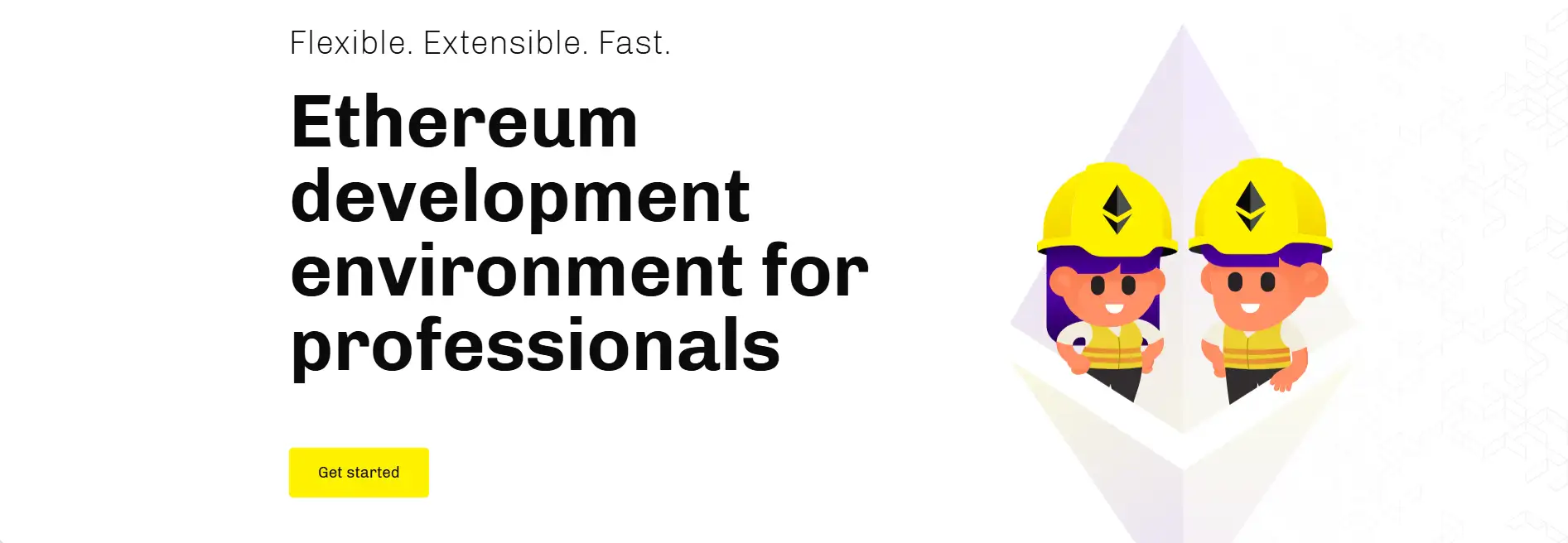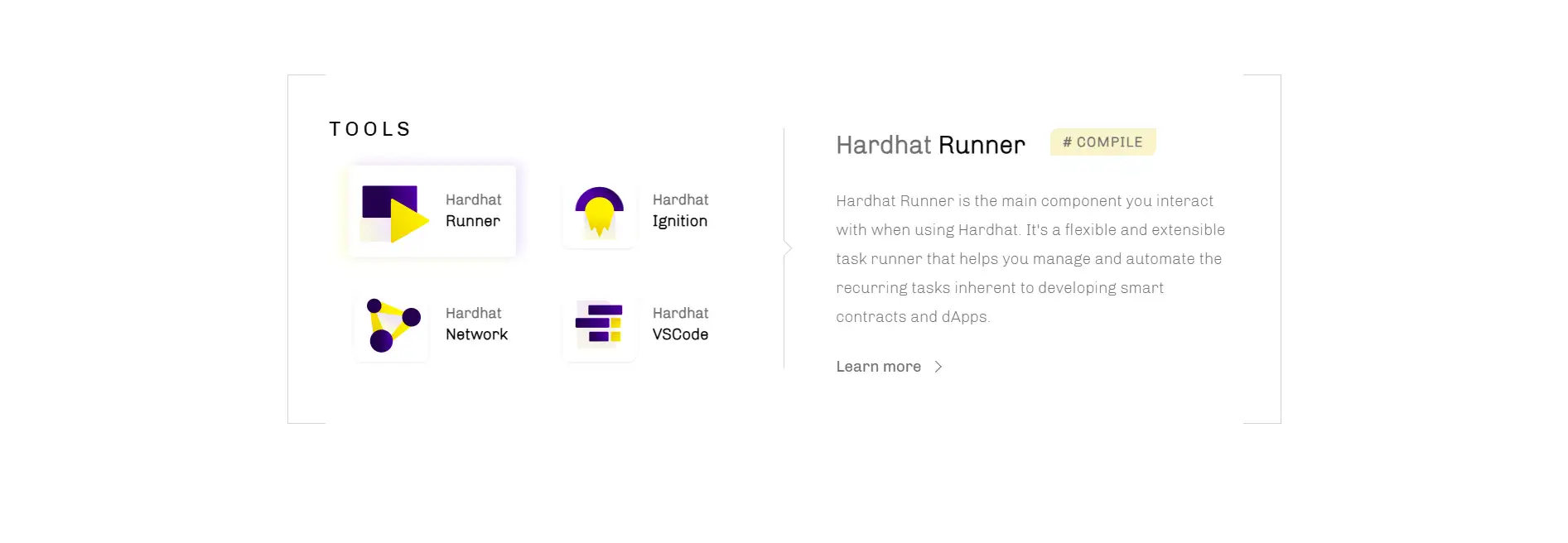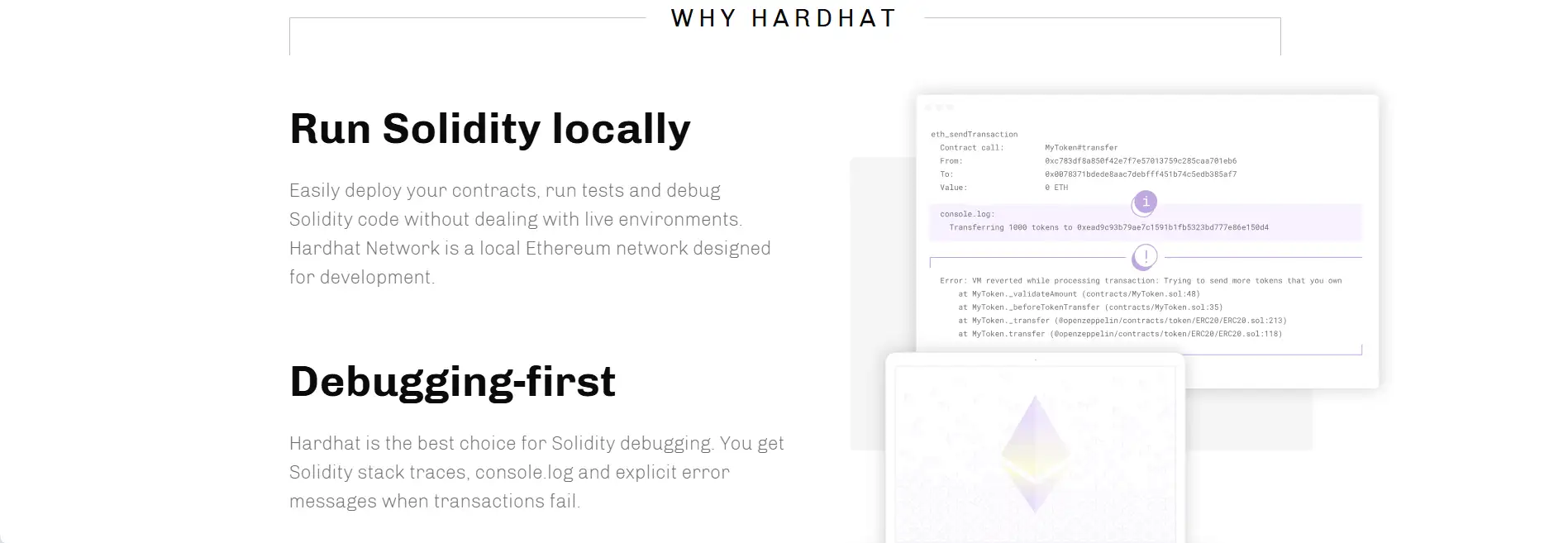About Hardhat
Hardhat is a professional-grade Ethereum development environment built to streamline the process of building and deploying smart contracts and decentralized applications (dApps). It offers developers a powerful suite of tools to compile, deploy, test, and debug Solidity-based contracts locally without interacting with live networks. Backed by the Nomic Foundation, Hardhat supports seamless integration with existing Web3 tools and frameworks through its robust plugin ecosystem and flexible architecture.
Designed for speed, extensibility, and efficiency, Hardhat aims to address the key challenges Ethereum developers face today. Whether you're working with multiple Solidity versions, building TypeScript projects, or contributing to larger dApp infrastructures, Hardhat provides a well-documented, debugging-first framework that can accelerate your entire workflow. It's trusted by leading Web3 organizations like Kyber, Synthetix, Decentraland, Uniswap, and Aragon One.
Hardhat is more than just a local Ethereum node — it's a full development environment that enables smart contract teams to iterate quickly, integrate efficiently, and build reliably. Launched and maintained by the Nomic Foundation, Hardhat was developed in response to growing developer frustration with older frameworks like Truffle. Its modularity and task-based runtime (the Hardhat Runner) allow developers to automate complex workflows while maintaining fine-grained control over testing and deployment processes.
One of the most defining components of Hardhat is the Hardhat Network, a built-in local Ethereum node that supports fast and deterministic testing. It enables Solidity debugging through advanced features like Solidity stack traces, real-time console.log outputs, and descriptive error messages that enhance visibility into failed transactions. Unlike traditional Ethereum nodes, Hardhat Network is optimized for developers, providing in-memory blockchain state, time manipulation, and mining controls.
Another cornerstone of the framework is its extreme extensibility. Through the plugin system, teams can integrate tools like Ethers.js, Web3.js, Foundry, Waffle, Solhint, and even alternative compilers like Vyper. These integrations are achieved via simple config extensions and are built using the same APIs available to developers, ensuring flexibility and transparency. The plugin marketplace includes both official and community-built plugins covering everything from testing and linting to contract verification, deployment, and security.
As part of its long-term vision, Hardhat continues to innovate with initiatives like Hardhat Ignition (a declarative deployment engine) and native TypeScript support. It also integrates with Visual Studio Code through its dedicated extension for syntax highlighting and smart contract navigation. This comprehensive toolchain allows development teams to standardize and scale their Solidity projects without losing flexibility or introducing technical debt.
In a competitive ecosystem where tooling is essential for shipping quality software, Hardhat stands out among developer frameworks like Truffle, Foundry, and Remix IDE. While Truffle provides a suite of legacy tools and Foundry offers a Rust-based CLI experience, Hardhat balances modern development practices with developer ergonomics, making it an ideal choice for teams looking to build robust Ethereum applications.
Hardhat provides numerous benefits and features that make it a standout project in the Ethereum development landscape:
- Local Ethereum Network: The built-in Hardhat Network allows local testing, fast deployment, and full transaction visibility—no need for testnets or external nodes.
-
Advanced Debugging Tools: Features like Solidity stack traces and
console.logsupport make it easy to understand failures during smart contract execution. - Modular Plugin System: Over 100 plugins support everything from testing and deployment to linting, upgrading, and visualizing contracts.
- Task-Based Architecture: Hardhat Runner enables the creation and extension of tasks to automate complex processes in smart contract development.
- TypeScript Integration: Full native support for TypeScript lets teams write safer, more maintainable code with type checking before execution.
- IDE Support: The VSCode extension adds syntax highlighting, code navigation, and integration for Hardhat-specific workflows directly in the editor.
- Vibrant Community & Adoption: Trusted by major Web3 organizations like Kyber, Synthetix, Uniswap, and Decentraland, and supported by a growing open-source community.
Hardhat offers a user-friendly onboarding process designed for developers at every experience level:
- Install Node.js: Ensure that you have Node.js installed. Hardhat runs on Node and requires a compatible version.
-
Create a New Project: Run
npm install --save-dev hardhatin your project directory and initialize a new Hardhat project withnpx hardhat. -
Write Your Contracts: Use the default
contracts/folder to create and edit your Solidity smart contracts. -
Compile & Test: Use the built-in
compileandtesttasks to validate your contracts with Hardhat Network or integrate Chai matchers for more advanced assertions. -
Run a Local Network: Use
npx hardhat nodeto spin up a local development blockchain that supports forking, mining, and scripted transactions. -
Deploy Your Contracts: Leverage Hardhat Ignition or
deployscripts to move contracts to testnets or mainnet, with full access to verification tools. -
Extend with Plugins: Explore and install plugins like
@nomicfoundation/hardhat-toolbox,hardhat-gas-reporter, orhardhat-deployto enhance functionality. - Explore Documentation: Visit the official documentation to learn more about advanced features like forking, state snapshots, and custom tasks.
- Join the Community: Connect with developers in the Hardhat Discord for support, tips, and plugin development.
Hardhat FAQ
Yes. With Hardhat Network, you can run a full-featured local Ethereum blockchain that mimics the behavior of real networks. It enables you to deploy, test, and debug contracts directly in your development environment, eliminating the need for testnet deployment unless required. This drastically improves development speed and precision.
Absolutely. Hardhat lets you simulate transaction reverts, manipulate block timestamps, and even inspect internal EVM operations using plugins like
hardhat-tracer. This capability is a core strength of the platform and is especially helpful for testing edge cases in smart contracts before they go live.Hardhat offers built-in support for multiple Solidity versions within a single configuration. This is particularly useful for projects maintaining legacy contracts or integrating external packages. You can define compiler settings on a per-contract basis, ensuring each file is compiled with the right version of Solidity.
Yes, Hardhat is designed with interoperability in mind. You can integrate your existing Ethers.js, TypeScript, or Truffle testing environments using its extensible plugin system. This means you can modernize your development process without rebuilding your entire workflow from scratch. Learn more about extensions on the official plugin page.
Yes! Hardhat introduced a developer-friendly feature that enables
console.logdirectly within Solidity contracts using the Hardhat Network. This allows you to trace values, monitor execution paths, and identify issues during testing just like you would in JavaScript. It’s a favorite feature among experienced devs working with Hardhat.
You Might Also Like












